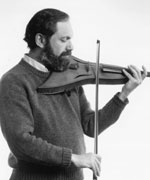Distinguished Faculty AwardMARVIN BRAM P'91, L.H.D. ’99

MARVIN BRAM P'91, L.H.D. ’99
Professor of History
1971-1997
October 17, 2003
Marvin Bram personified what it meant to be a truly great teacher. He is described as having an inexhaustible intellectual capacity, a firm belief in the inherent goodness of human beings, a respect for the potential of each and every student, and a personal presence that is gentle and kind.
After two years of service with the United States Army, he graduated from the University of Chicago with a degree in general studies of the humanities and was awarded the distinguished Binyon Prize in Humanities. After graduation his employment history included the position of science editor for Barnes and Noble, senior science editor for Scott Foresman and directing editor for McGraw-Hill. In 1971, after a year teaching at the University of Hawaii, Professor Bram was appointed to the history department at Hobart and William Smith Colleges. While at the Colleges he received his Ph.D. in European Intellectual history from the University of Rochester in 1973.
Professor Bram found a home at the Colleges where his inquisitive scholarship and unbounded enthusiasm were valued and nurtured. From his earlier days at Hobart and William Smith it was obvious to students and colleagues alike that Marvin was a professor who had the rare ability to see and teach the “big picture.” He drew on an astounding depth of knowledge in multiple and diverse disciplines such as psychology, biology, music, semiotics, philosophy, anthropology, literature, intellectual history. In an increasingly noisy, chaotic and disconnected world, Marvin’s classrooms were a place where warmth, compassion, and intellectual solace prevailed.
For more than 20 years, students eager to learn in such an environment flocked to his classroom. Like a modern day Merlin, Marvin led students on a journey that stretched from ancient Sumer to 20th century Paris, from Egyptian hieroglyphics to James Joyce, and from tribal councils to Sigmund Freud.
Virtually all of his students were enthralled by Marvin’s teaching, and many would find the teachings of this Professor to be life transforming.
The professional accolades for Professor Bram’s teaching abilities are many, including his selection as a recipient of the prestigious Sears-Roebuck Foundation “Teaching Excellence Leadership Award.” Professor Bram was also appointed to a Donald A. Harter professorship and was a founding member of the National Humanities Faculty.
Professor Bram is a prolific author of scholarly articles and books, including “Elements of Symbolic History,” “Round of the Four Quarters,” “A Western Analects,” “The Recovery of the West” and “The Art of the Fugue.” Bram’s love of stringed instruments led him to create a new breed of violas, using household items found in the kitchen.
A quote from one of Marvin’s favorite teachers, Mahatma Gandhi, perhaps nicely sums up why Professor Bram the teacher, colleague, friend, and mentor had such a profound impact on the lives of so many students. Gandhi said “We must be the change we wish to see.” Marvin taught who he was. For that generation of students is grateful.
